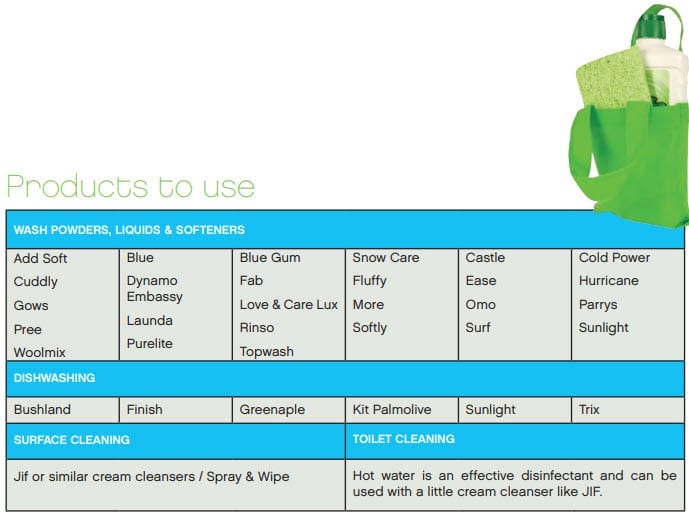How to Maintain Your Septic System: Dos, Don’ts & Why Chemical-Free Living Matters
Your septic system plays a vital, behind-the-scenes role in managing your household’s wastewater. Whether you’re on a rural property or in a semi-urban setting without access to a sewer system, keeping your septic tank healthy is crucial—not just for your home’s plumbing, but also for the surrounding environment.
However, many people unknowingly damage their septic systems by pouring harmful chemicals down the drain or ignoring simple maintenance routines. In this guide, we’ll explore the essential dos and don’ts for septic system care and explain why avoiding chemical cleaners is one of the smartest things you can do for your home and our planet.
Contents
Understanding How Septic Systems Work
Why Chemical-Free Living Supports Septic Health
Septic System Dos – Best Practices to Follow
Septic System Don’ts – Habits That Cause Harm
Recognising Signs of Septic System Trouble
Natural Alternatives for Cleaning & Maintenance
How Garden Master Can Help
Understanding How Septic Systems Work
A septic system is a self-contained, on-site wastewater treatment system. It processes everything that goes down your sinks, showers, toilets, and laundry. Once waste enters the septic tank, solids settle to the bottom, oils float to the top, and liquid wastewater flows out to a drainage field where it filters through the soil.
For the system to work properly, naturally occurring bacteria are essential—they break down waste and help prevent blockages and odours. Harsh chemicals and poor household practices can kill off these bacteria, causing the system to fail over time.
Why Chemical-Free Living Supports Septic Health
Most commercial cleaning products contain harsh chemicals like bleach, ammonia, phosphates, and synthetic surfactants. These substances are toxic to the beneficial bacteria your septic system relies on.
Common Chemicals That Damage Septic Systems:
- Chlorine – Found in numerous cleaning products, used for pools and dumped into many water supplies, studies suggest that chlorine exposure is linked with an increased risk of heart disease, allergic reactions and miscarriages, as well as increased rates of bladder, colon and rectal cancers.
- Ammonia – Found in all-purpose cleaners, antibacterial cleaners, window cleaners and furniture polish. Ammonia can irritate eyes and lungs, cause burns or rashes, and, if mixed with chlorine products, it can cause deadly chloramine gas; exposure to which could be fatal.
- Pesticides & Fertilisers – Many common pesticides used for gardening are known carcinogens, meaning they cause Cancer.
- Cationic & Anionic Solutions – Found in laundry detergent and washing liquid, if accidentally ingested, they can cause nausea, vomiting, shock, convulsions or, most severely, coma.
These are some of the most common; however, this list doesn’t even scratch the surface. If you must buy consumer brand cleaning products, look for natural products and read the label to ensure ALL products are natural and not harmful to you or the environment.
Instead, choose biodegradable, septic-safe cleaning products, and minimise using all chemicals where possible.
Septic System Dos – Best Practices to Follow
To keep your system running smoothly:
✅ Use septic-safe cleaners and detergents that are free from chlorine, bleach, and phosphates.
✅ Pump your tank regularly (usually every 3–5 years, depending on household size and usage).
✅ Fix leaking taps and toilets to avoid flooding the system.
✅ Spread out laundry loads and heavy water use across the week to prevent overload.
✅ Install water-efficient appliances and fittings to reduce water entering the system.
✅ Keep trees and shrubs away from the drain field to avoid root damage.
✅ Know your system’s layout and avoid driving or building over the septic tank or drain field.
 Septic System Don’ts – Habits That Cause Harm
Septic System Don’ts – Habits That Cause Harm
Bad habits can cause serious (and expensive) septic system issues. Avoid the following:
❌ Flushing anything other than human waste and toilet paper. Avoid wipes, tissues, tampons, nappies, floss, and paper towels.
❌ Pouring fats, oils or grease down the sink—they solidify and clog pipes.
❌ Using the toilet or sink as a bin for food scraps, chemicals, or paint.
❌ Running multiple appliances at once (e.g., shower, washing machine, and dishwasher) which can overload the system.
❌ Neglecting inspections and maintenance, especially if you notice slow drainage or odours.
❌ Using chemical drain cleaners – opt for a plunger or plumber’s snake instead.
Recognising Signs of Septic System Trouble
Early intervention can save you thousands in repairs. Be aware of:
Foul odours from drains, toilets, or near the tank or drain field.
Slow-draining sinks, showers, or toilets—a classic sign of a clog or overload.
Water pooling in your yard near the drain field—this may indicate overflow or failure.
Lush, bright green grass over your drainage field—it may be fertilised by leaking wastewater.
Gurgling sounds in your pipes or sewage backups.
If you notice any of these, contact a licensed septic service technician immediately.
Natural Alternatives for Cleaning & Maintenance
Want to clean your home safely and protect your septic system? The general rule should be, if you couldn’t safely eat it, don’t put it on your skin or your atmosphere. These chemicals cause significant damage over time to your body and to the environment, and flushing them into waterways kills plant life and harms animals, as well as you.
Just about everything can be cleaned with a few simple natural ingredients—mix these together, and you have an all-purpose cleaning solution.
Here are some simple swaps:
Vinegar and baking soda for cleaning drains and surfaces
Castile soap or eco-friendly dish soap for washing
Lemon juice and bicarb soda for freshening the kitchen
Hot water and a plunger instead of chemical drain cleaners
Borax or washing soda in place of bleach for whitening laundry
These options are not only septic-safe, but also better for your health and the environment.

How Garden Master Can Help
At Garden Master, we’re experts in environmentally responsible wastewater solutions. Our Aerated Wastewater Treatment Systems (AWTS), Advanced Secondary Treatment Systems (STS) and Greywater Recycling Systems are designed with sustainability and efficiency in mind. We support households across NSW, Victoria, ACT, and beyond in managing their waste safely and sustainably.
We also provide:
Professional installation and servicing
Ongoing maintenance plans
Guidance on safe water use
Expert advice on reducing chemical impact
📞 Contact us on 1800 632 582 or submit a request via our online contact page for a free quote and consultation.
✅ Final Tip
Your septic system is only as good as the habits of the people using it. By being chemical-conscious and following best practices, you’ll extend the life of your system, save money, and help protect Australia’s waterways and environment.

